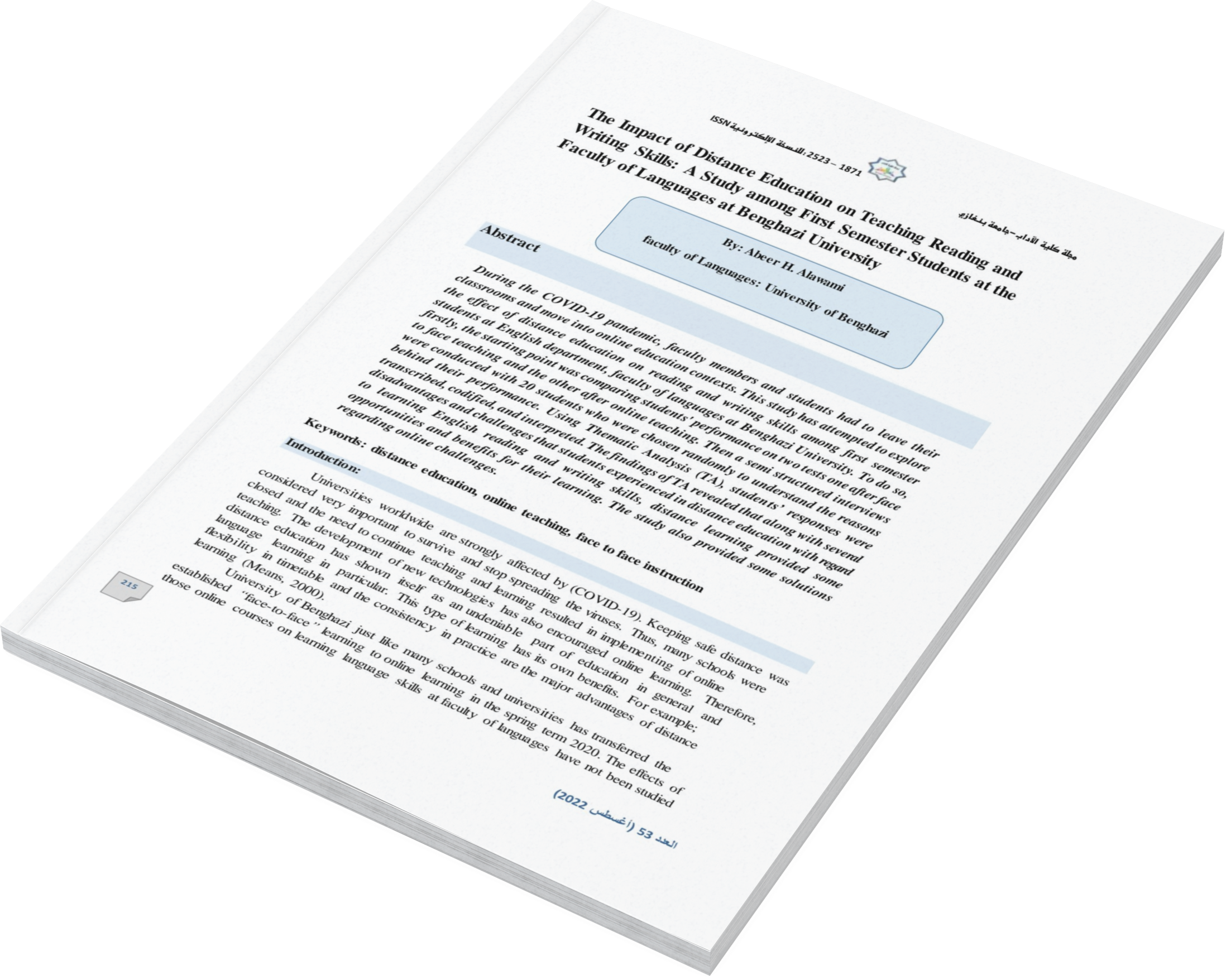The Impact of Distance Education on Teaching Reading and Writing Skills: A Study among First Semester Students at the Faculty of Languages at Benghazi University
DOI:
https://doi.org/10.37376/jofoa.vi53.6517الكلمات المفتاحية:
distance education، online teaching، face to face instructionالملخص
During the COVID-19 pandemic, faculty members and students had to leave their
classrooms and move into online education contexts. This study has attempted to explore
the effect of distance education on reading and writing skills among first semester
students at English department, faculty of languages at Benghazi University. To do so,
firstly, the starting point was comparing students' performance on two tests one after face
to face teaching and the other after online teaching. Then a semi structured interviews
were conducted with 20 students who were chosen randomly to understand the reasons
behind their performance. Using Thematic Analysis (TA), students’ responses were
transcribed, codified, and interpreted. The findings of TA revealed that along with several
disadvantages and challenges that students experienced in distance education with regard
to learning English reading and writing skills, distance learning provided some
opportunities and benefits for their learning. The study also provided some solutions
regarding online challenges.
التنزيلات
المراجع
Braun, V., & Clarke, V. (2006). Using thematic analysis in psychology. Qualitative Research in
Psychology, 3(2), 77–101
- Carver, L. (2020). Supporting learners in a time of crisis. Advances in Social Sciences Research
Journal, 7(4), 129–136.
- Chester, A., Buntine, A., Hammond, K., & Atkinson, L. (2011). Podcasting in education , student
attitudes, behavior and self- efficacy. Educational Technology & Society.14 (2), 236–247
- Davis, N., Gough, M. & Taylor, L. (2019). Online teaching: Advantages obstacles, and tools for
getting it right. Journal of Teaching in Travel & Tourism, 19(3), 256–263.
- Dong, C. , Cao, S. Li, H. (2020) Young children’s online learning during COVID-19 pandemic: Chinese
parents’ beliefs and attitudes- science direct. Child Youth Serv Rev.118:105440.
- Dunleavy, M., Dexter, S., & Heinecke, W. (2007). What added values does a 1:1 student to laptop ratio
bring to technology supported teaching and learning? Journal of Computer Assisted Learning. 1(1).
Retrieved from http://pkp.sfu.ca/ojs/demo/present/index.php/jce/article/view/171/5
- Fisher, K. (2010). Online student engagement: CCSSE finds enrollment status and online experience
are key. Community College Week, 22(20), 7.
- Fouts, J.T. (2000). Research on computers and education: Past, present, and future. Retrieved from
http://www.portical.org/fouts.pdf Fulton, C. (2020) Collaborating in online teaching: inviting e-guests
to facilitate learning in the digital environment. Inf Learn Sci. 121(8) 579–585. doi:10.1108/ILS-04-
-0116
- Gahala, J. (2001). Promoting technology use in schools. North Central Regional Educational
Laboratory Critical Issue. Retrieved from
http://www.ncrel.org/sdrs/areas/issues/methods/technlgy/te200.htm
- Healey, D. (2001). Are technology-using students better learners? Presentation at the Teacher to
Teacher Conference, Abu Dhabi, United Arab Emirates. Retrieved from
http://www.oregonstate.edu/healeyd/t2t.html
- Horwitz, E. K. (2012). Becoming a foreign language teacher (2nd ed.). Boston, MA: Pearson. Honey,
M., Culp, K.M., & Spielvogel, R. (2005). Using technology to improve student achievement. North
Central Regional Educational Laboratory Critical Issue. Retrieved from
http://www.ncrel.org/sdrs/ areas/issues/methods/technlgy/te800.htm
- Jayathirtha, G. Fields, D. Kafai, Y. & Chipps, J. (2020). Supporting making online: The role of
artifact, teacher and peer interactions in crafting electronic textiles. Inf Learn Sci. 121(5/6):371–
doi:10.1108/ILS-04-2020-0111
- Johnston, M. (2000). Using technology to enhance new models of teaching and learning. The
- Informed Educator Series. Arlington, VA: Educational Research Service
- Means, B. (2000). Technology use in tomorrow’s schools. Educational Leadership, 58(4)57-61.
- McKinney, D., Dyck, J., & Luber, E. (2009). iTunes university and the classroom: Can podcasts replace
professors? Computers and Education, 52, 617–623
- Muppala, JK. & Kong, CK. (2007). Podcasting and its use in enhancing course content.
- Computers and Advanced Technology in Education.
- Nimavat, N. Singh, S. Fichadiya, N. Sharma, P. Pandit, N. (2021) Online medical education in
- India different challenges and probable solutions in the age of COVID-19. Adv Med Educ Pract.12
(12):732-743. doi:10.2147/AMEP.S295728
- Rogers, P. (2009). Encyclopedia of Distance Learning, Second Edition. Idea Group Inc (IGI
- Russell, J. (2001). Scientific communication at the beginning of the twenty-first century.
International Social Science Journal. 53(168), 271-282.
- Sankaranarayanan, S. Kandimalla, S. Cao, M. Maronna, I. An, H. (2020) Designing for learning during
collaborative projects online: tools and takeaways. Inf Learn Sci. 121(7/8), 569– 577.
doi:10.1108/ILS- 04-2020-0095
- Schlenz, M., Schmidt, A., Wstmann, B., Krmer, N., Schulz-Weidner, N. (2020) Students’ and
lecturers’ perspective on the implementation of online learning in dental education dueto SARSCOV-
(COVID-19): A cross-sectional study. BMC Med Educ. 20 (20), 20:354.
doi:10.1186/s12909-020-02266-3
- Sethy, S. (2008). Distance education in the age of globalization: An overwhelming desire towards
blended learning. Turkish Online Journal of Distance Education 9(3), 29-44 Retrieved from
https://www.researchgate.net/publication/26522310_Distance_education_in_the_age_of_
globalization_An_overwhelming_desire_towards_blended_learning
- Spack, R. (1985). Literature, reading, writing and ESL: Bridging the gaps. TESOL Quarterly, 19(4),
-725
- Toquero, C. M. (2021). Emergency remote education experiment amid COVID-19
pandemic.International Journal of Educational Research and Innovation (IJERI), 1(15), 162–
- Waddoups, G. (2004). Technology integration, curriculum, and student achievement: A review of
scientifically based research and implications for easy tech. Portland.

التنزيلات
منشور
كيفية الاقتباس
إصدار
القسم
الرخصة
الحقوق الفكرية (c) 2024 مجلة كلية الاداب

هذا العمل مرخص بموجب Creative Commons Attribution-NonCommercial-NoDerivatives 4.0 International License.




